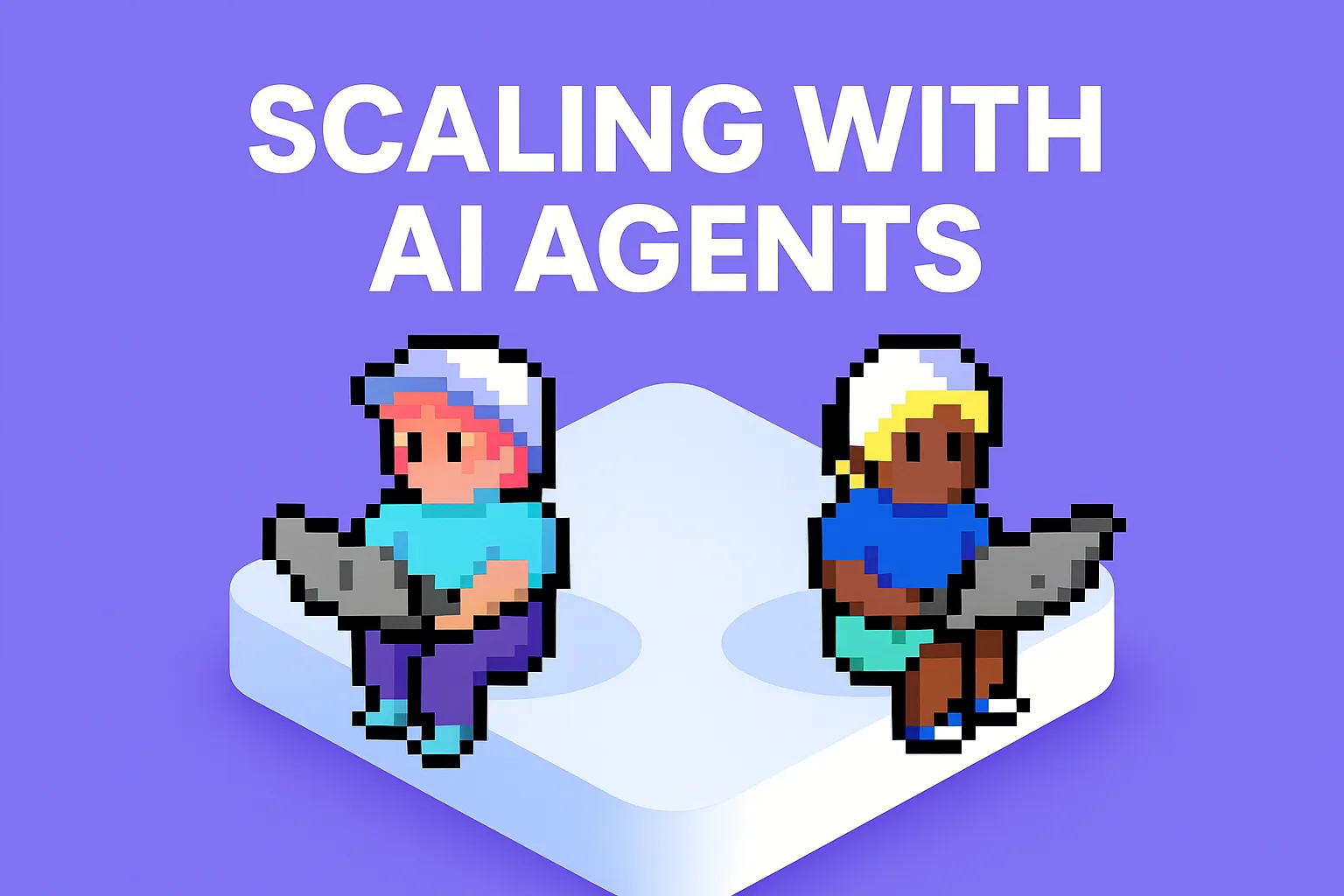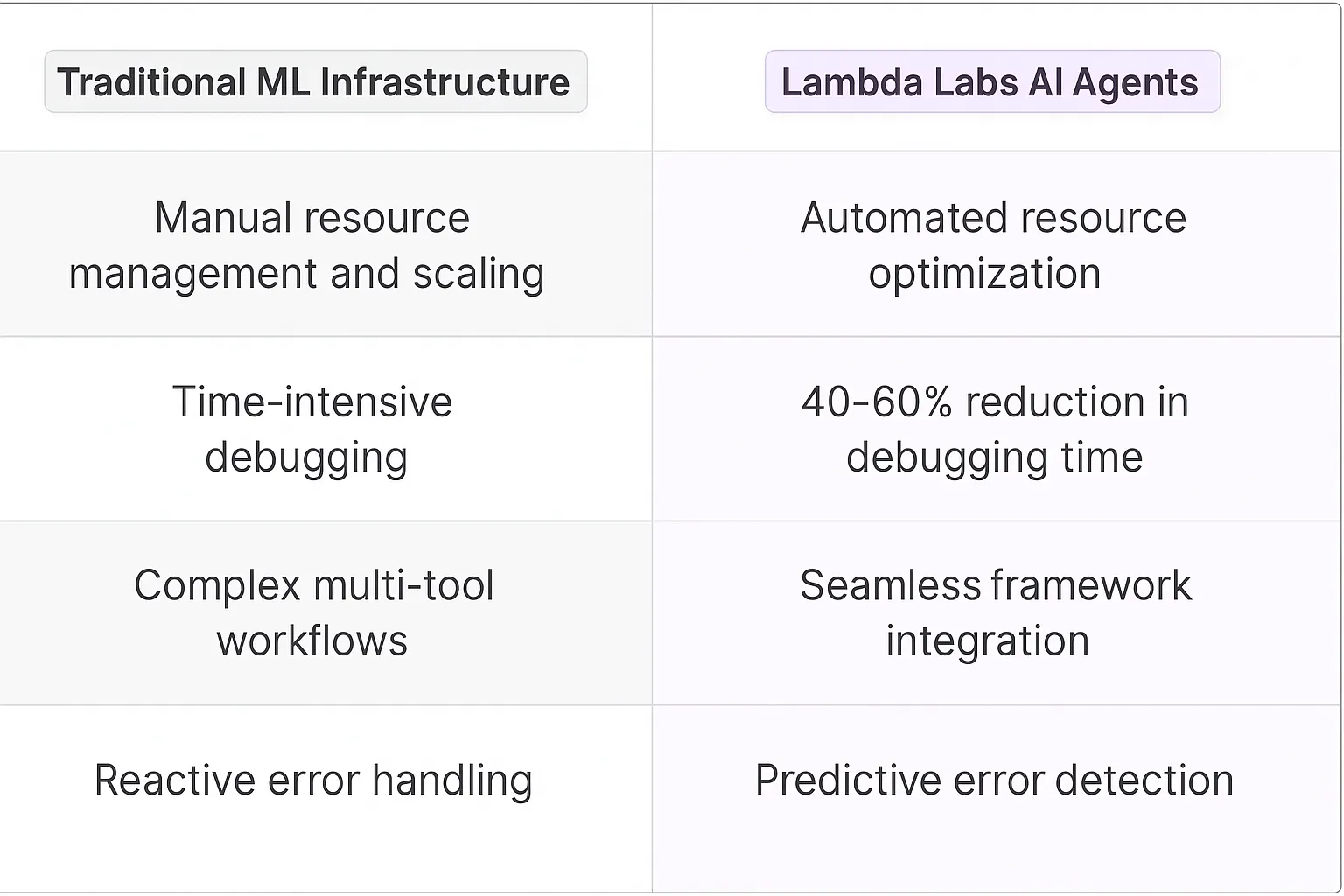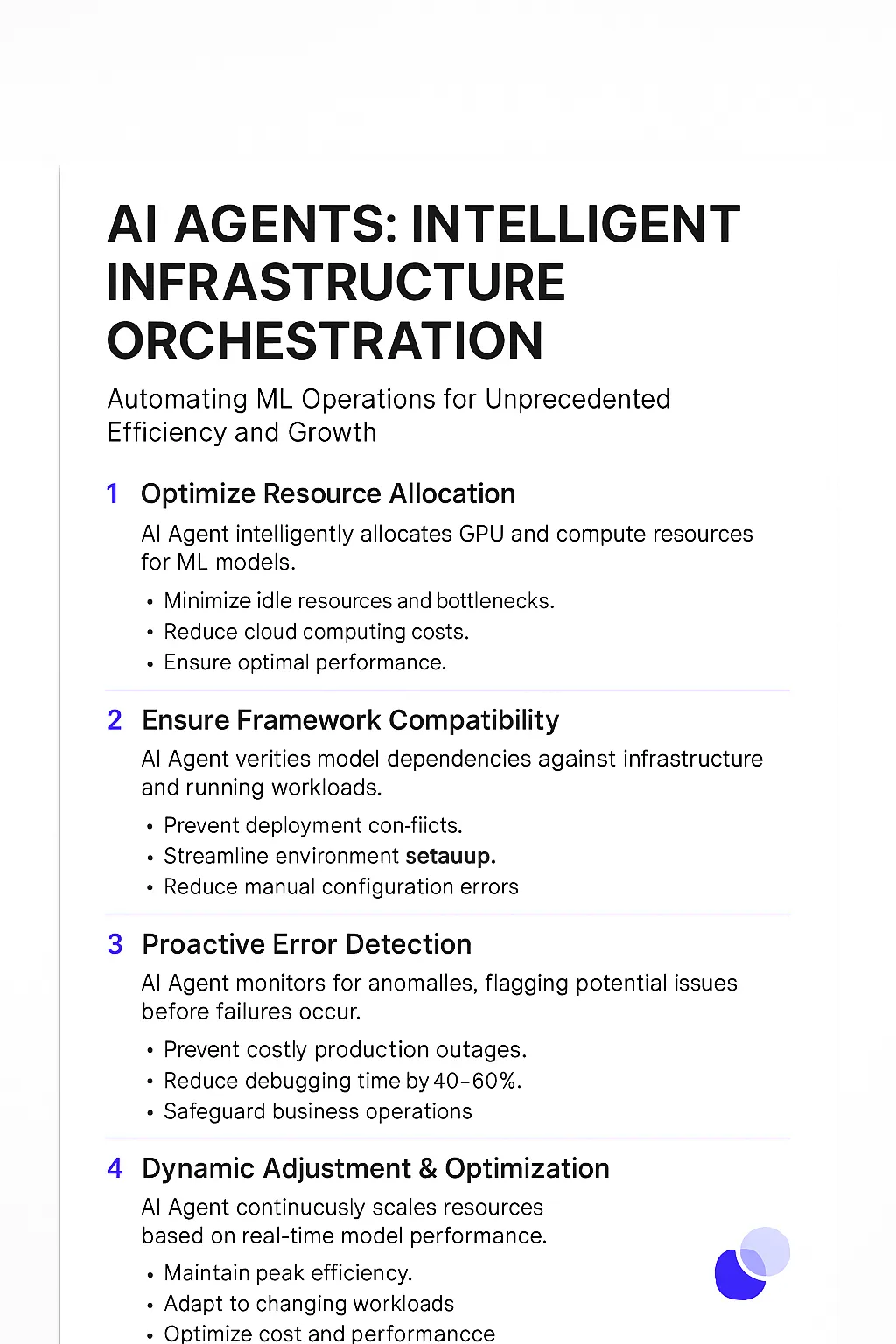Lambda Labs
Enterprise AI Infrastructure Platform
What is Lambda Labs?
Lambda Labs delivers an enterprise-grade AI infrastructure platform that powers some of the most computationally intensive machine learning workloads. The platform combines sophisticated AI agents with high-performance computing resources, enabling organizations to build and deploy machine learning models at scale without getting bogged down by infrastructure complexity.
Key Features of Lambda Labs
- Intelligent resource management that automatically optimizes GPU utilization
- Predictive error detection that catches issues before they impact production
- Dynamic scaling capabilities that adjust to workload demands
- Framework-agnostic compatibility that supports major ML libraries
- Built-in monitoring and optimization suggestions

Benefits of AI Agents for Lambda Labs
What would have been used before AI Agents?
Software development teams traditionally relied on complex manual processes for model training and deployment. Engineers spent countless hours writing custom scripts, managing infrastructure, and debugging deployment issues. The standard workflow involved juggling multiple tools, cloud services, and frameworks - creating significant cognitive overhead and slowing down the path from research to production.
What are the benefits of AI Agents?
Lambda Labs' AI agents fundamentally transform the ML development cycle through intelligent automation and deep system understanding. These digital teammates handle the heavy lifting of infrastructure management, allowing engineers to focus on model architecture and business logic.
The agents excel at:
- Automated resource optimization - dynamically scaling compute resources based on workload demands and cost constraints
- Intelligent error detection - identifying potential issues before they impact production systems through pattern recognition across deployment logs
- Framework compatibility management - ensuring smooth integration between different ML frameworks, package versions, and dependencies
- Performance monitoring - tracking key metrics and suggesting optimizations for model training and inference
A key differentiator is the agents' ability to learn from each deployment, continuously improving their understanding of system behaviors and edge cases. This creates a compounding efficiency effect - the more the agents are used, the more effective they become at managing complex ML workflows.
For engineering teams, this translates to:
- 40-60% reduction in deployment-related debugging time
- Near-zero infrastructure management overhead
- Faster iteration cycles between research and production
- Improved resource utilization and cost efficiency
The network effects of Lambda Labs' agent ecosystem create a powerful platform that grows more valuable as it learns from each interaction, setting a new standard for ML infrastructure management.

Potential Use Cases of Lambda Labs AI Agents
Lambda Labs AI Agents excel at handling complex computational tasks and data processing workflows that traditionally required significant manual oversight. These digital teammates integrate seamlessly into existing development environments while managing resource-intensive operations.
Machine Learning Operations
- Automated model training pipeline management across multiple GPU instances
- Real-time monitoring and optimization of computational resources
- Dynamic scaling of training workloads based on performance metrics
- Continuous evaluation of model accuracy and drift detection
Data Processing and Analysis
- Large-scale dataset preprocessing and feature engineering
- Automated data quality checks and validation procedures
- Parallel processing of complex analytical workflows
- Real-time data transformation and enrichment pipelines
Development Operations
- Automated code review and optimization suggestions
- Performance bottleneck detection and resolution
- Resource utilization monitoring and cost optimization
- Infrastructure scaling and management
Research and Experimentation
- Automated hyperparameter optimization
- Systematic A/B testing of model architectures
- Experiment tracking and reproducibility management
- Research paper analysis and implementation testing
Lambda Labs AI Agents transform how teams approach complex computational tasks, enabling developers and researchers to focus on strategic decisions while the agents handle operational complexities. The result is faster iteration cycles and more reliable outcomes in machine learning projects.
Implementation Strategy
Starting with focused, well-defined tasks allows teams to build confidence in AI Agent capabilities. Begin by implementing agents for specific workflows like data preprocessing or model monitoring, then gradually expand their responsibilities based on performance and team needs.
Success metrics should track both computational efficiency gains and team productivity improvements. This dual focus ensures that AI Agents deliver tangible value while supporting rather than replacing human expertise.

Industry Use Cases
Lambda Labs AI agents are transforming how businesses operate across multiple sectors, with implementations that go far beyond basic automation. These digital teammates integrate seamlessly into existing systems while bringing sophisticated capabilities that fundamentally change how teams work.
The real power of Lambda Labs agents emerges when examining specific industry applications. From healthcare providers using AI for patient data analysis to financial institutions deploying agents for risk assessment, the technology adapts to unique industry requirements and compliance frameworks. What makes these implementations particularly compelling is how they maintain high performance while operating within industry-specific constraints.
Looking at actual deployments reveals patterns of success: organizations that thoughtfully integrate Lambda Labs agents into their core processes see measurable improvements in accuracy and completion times. The key differentiator is Lambda Labs' ability to handle complex, multi-step tasks while maintaining context - a crucial capability for industries with intricate workflows and regulatory requirements.
Healthcare: Accelerating Medical Imaging Analysis with Lambda Labs AI
Medical imaging departments face massive bottlenecks analyzing the thousands of scans they process daily. Lambda Labs AI agents transform this workflow by functioning as specialized digital teammates for radiologists and imaging specialists.
The agents leverage Lambda's deep learning capabilities to pre-screen CT scans, MRIs, and X-rays for potential abnormalities - flagging concerning patterns for human review while deprioritizing clearly normal results. This intelligent triage system reduces the cognitive load on medical professionals who can focus their expertise on the most critical cases.
A key differentiator is Lambda's ability to train these agents on institution-specific imaging data, creating customized detection models that align with each facility's equipment and patient populations. The agents become more accurate over time through continuous learning from radiologist feedback and validation.
Beyond basic screening, these AI agents serve as real-time collaboration tools during image analysis. They can instantly surface relevant prior scans, medical literature, and case studies based on the specific pathology being examined. This contextual intelligence helps doctors make more informed diagnostic decisions.
The impact metrics from early adopters are compelling: radiology departments using Lambda AI agents report 35% faster scan processing times and a 28% reduction in missed abnormalities during initial reads. For time-sensitive conditions like stroke or trauma, this acceleration of accurate diagnosis directly translates to improved patient outcomes.
Lambda's healthcare AI agents demonstrate how thoughtfully deployed artificial intelligence can enhance rather than replace human medical expertise. The technology amplifies doctors' capabilities while keeping them firmly in control of clinical decision-making.
Manufacturing: Optimizing Quality Control with Lambda Labs AI
Manufacturing quality control presents a perfect testing ground for Lambda Labs' AI capabilities. The traditional QC process relies heavily on human inspectors who must maintain constant vigilance across multiple production lines - an approach that's both exhausting and prone to inconsistency.
Lambda's AI agents transform this dynamic by operating as specialized digital teammates alongside QC personnel. These agents process visual data from high-speed cameras positioned throughout the production line, detecting defects and irregularities with superhuman precision at speeds of up to 200 units per minute.
What makes Lambda's approach particularly effective is its ability to identify subtle patterns that even experienced inspectors might miss. The AI can spot microscopic cracks, color variations, or assembly anomalies across thousands of products with unwavering attention. When integrated with IoT sensors, these agents also correlate defects with specific manufacturing conditions, enabling predictive maintenance before quality issues arise.
The system's adaptive learning capabilities stand out in real-world applications. One automotive parts manufacturer deployed Lambda AI agents across their brake pad production line and saw defect detection accuracy improve from 92% to 99.7% within three months. The AI continuously refined its detection models based on feedback from quality control specialists, learning to recognize increasingly nuanced variations in product quality.
Beyond pure detection, Lambda's agents serve as knowledge amplifiers for QC teams. They maintain detailed histories of defect patterns, automatically generate comprehensive quality reports, and provide real-time alerts when systematic issues emerge. This intelligence layer helps manufacturing teams move from reactive inspection to proactive quality management.
The numbers tell a compelling story: factories using Lambda's AI quality control system report an average 43% reduction in defect escape rates and a 31% decrease in false positives. For high-precision manufacturing operations, these improvements translate directly to reduced waste, lower costs, and enhanced product reliability.
Lambda Labs' manufacturing AI agents showcase how artificial intelligence can enhance human expertise in complex industrial environments. The technology creates a powerful feedback loop between human judgment and machine precision, elevating the entire quality control process.
Considerations and Challenges
Implementing Lambda Labs AI agents requires careful planning and strategic consideration across multiple dimensions. The technical complexity combined with organizational readiness creates a unique set of hurdles that teams must navigate.
Technical Challenges
Lambda Labs agents demand significant computational resources and proper infrastructure setup. Teams often underestimate the processing power needed for optimal performance. The integration process requires deep technical expertise in both machine learning and systems architecture.
API rate limits pose another technical constraint. Without proper request management and queueing systems, teams can hit usage caps that disrupt agent functionality. Implementing robust error handling and retry logic becomes critical for production deployments.
Data privacy and security requirements add additional complexity. Teams must carefully architect systems to ensure sensitive information remains protected while still allowing the agent to access necessary data sources.
Operational Challenges
The learning curve for teams working with Lambda Labs agents tends to be steep. Engineers need time to understand the agent's capabilities, limitations, and best practices for implementation. This knowledge gap can slow initial deployment timelines.
Cost management requires ongoing attention. Without proper usage monitoring and optimization, API costs can escalate quickly. Teams should implement tracking systems and set clear budget thresholds.
Change management across the organization poses another significant challenge. Teams must develop new workflows and processes to effectively collaborate with AI agents. This cultural shift takes time and requires strong leadership support.
Maintenance and monitoring needs often exceed initial expectations. Teams should plan for dedicated resources to handle agent updates, performance tuning, and issue resolution. Creating comprehensive documentation and playbooks helps reduce operational overhead.
Transforming ML Infrastructure Through Intelligent Digital Teammates
Lambda Labs' AI agents mark a fundamental shift in how organizations approach machine learning infrastructure. The platform's ability to learn and improve through network effects creates compound benefits that extend beyond simple automation. As AI development continues to accelerate, Lambda Labs' approach to infrastructure management through intelligent digital teammates positions organizations to scale their ML operations effectively while maintaining control over costs and complexity. The real value emerges in the platform's ability to turn infrastructure management from a bottleneck into a strategic advantage.













